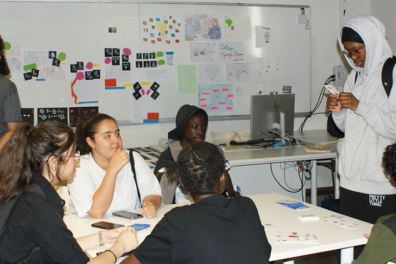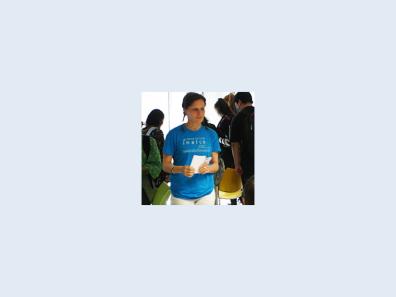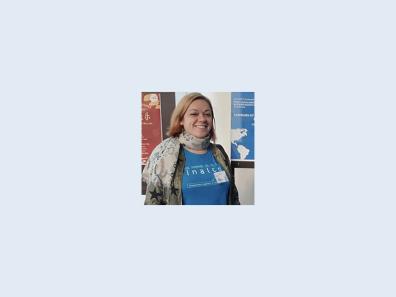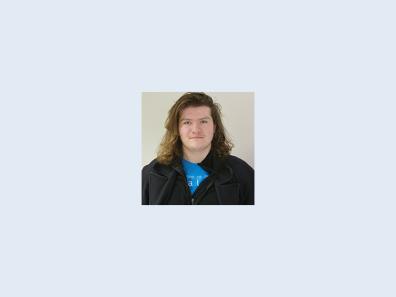Cordée "Langues et cultures du Monde" 2023, an ambitious year-round program in schools

Supported by the REVE (Réussite étudiante et Vie étudiante) department and coordinated by Albane Molinier and Florian Targasince 2021, the "Languages and Cultures of the World" cordée has trained some fifteen animators to work in roped-off schools with volunteer middle and high school students. This year, a total of 534 students benefited from the program between October and June. The scheme set up in the schools and at Inalco enabled 500 hours of awareness-raising on linguistic diversity and plurilingualism through a variety of workshops: discovering the languages of the world, journalistic-linguistic investigations, creative writing and plurilingual theater. The roped students also take part in assembly days organized at Inalco, giving them an opportunity to discover the establishment, visit a museum, or reflect on their career plans.
The Cordée "Langues et Cultures du Monde"
Ropee "Langues et Cultures du Monde" welcomed 260 students to Inalco in early June.
On June 1, we welcomed 200 students from the Paris region. On this closing day, some students visited the Musée du Quai Branly and the Louvre, while others finalized the cordées workshops at Inalco and met the writer Nabil Wakim.
In the afternoon, middle and high school students enjoyed a cultural program at the auditorium. They discovered the scenic talents of members of the plurilingual undergraduate theater workshop, the Persian choir and Inalco's student associations, while exploring our relationship with languages and their place in the world, through performances in a dozen different languages, some of them endangered (languages of Vanuatu).
Multilingual games, meetings with language and culture professionals, and workshops organized by student associations provided access to a variety of worlds, while arousing students' curiosity about possible academic and professional orientations in the fields of languages and cultures.
On June 5, 60 students from Châteaudun (Eure-et-Loir) were also able to come to Inalco for a closing day where they took part in language workshops, discovered the travel diaries from Central Asia on display at Inalco and visited Paris through linguistic and cultural treasure hunts.
These days also provided an opportunity to showcase the restitutions made by the roped students, who were proud of the work they had accomplished throughout the year as part of the program: multilingual displays, writing and theater work, mask-making, an exhibition of objects and presentations of interviews conducted with people from diverse backgrounds highlighted the reflections carried out on individual and collective identities, multilingualism, linguistic and cultural diversity and curiosity about others.
These days follow those organized in October 2022 and January 2023, the other two highlights of the cordée
In October, the welcome days introduced the students to the Maison de la Recherche, Inalco's historic site. They learned about Inalco's history, studies and career opportunities. The presentation of the cordées program included introductory language and writing activities and a game to discover the site.
The second gathering of the year enabled 220 students, from 4th to Terminale, from Aquitaine and Ile-de-France, to meet, exchange ideas and enjoy a wide range of cultural and linguistic activities on January 16 and 17, 2023.
Language discovery activities (Persian, Estonian, Japanese), discovery of writing systems, words of foreign origin, plurilingual theater and meetings with various Inalco members (students, doctoral students, employees) and visits and workshops offered by BULAC delighted students, organizers and teachers.
Outside cultural activities were also very well received by participants: guided tours of the collections plateau at the Musée du Quai Branly and a meeting with an Oceania specialist, observation of Coronelli's globes at the Bibliothèque Nationale de France, a multicultural discovery game of Paris, a theatrical outing: all these activities helped give meaning to the "Languages and Cultures of the World" cordée among the Aquitaine and Ile-de-France students hosted.
Portraits and workshops
- Focus on... language discovery awareness workshops
with Noémie Decalf, "Langues et cultures du Monde" cordée coordinator, Inalco

What do the cordées involve?
As animators, we work in middle and high schools in the form of language discovery awareness workshops. This year, I worked mainly in two middle schools, one in Île-de-France (Georges Braque) and the other in Eure-et-Loir (Brossolette). The groups were made up of between ten and fifteen students who volunteered to take part in these programs. We met twice a month for a total of 16 hours of workshops, during which we dealt with a variety of themes: different writing systems, the languages of our environment, the geopolitics of languages and their power relationships. We evoked the richness and diversity of our planet's languages through fun, interactive activities in which young people are the driving force behind the discoveries they make. We provide them with a structured, caring framework, and then it's up to them to work in groups to solve enigmas and find clues to discover more about the themes covered. The aim is above all to be in a spirit of discovery, curiosity, travel, cultural openness.
You work as a team?
Yes, the program coordinators, Albane Molinier and Florian Targa, made sure that we could be split into small groups of speakers in different establishments. This enabled us to exchange ideas, train together to prepare the workshops and evolve our practices by sharing our feedback.
What made you want to take part in this program?
The encounter between didactics and the social commitment that the project implies. In view of my various experiences in the field of language teaching and in a Montessori school, I find here a new playground, if I may say so: we have the opportunity to invest ourselves in a learning framework linked to the educational system in place, while infusing it with our own dynamic based on non-formal learning methods: smaller groups, an interactive framework, valuing students' personal journeys. It's very rich!"
- Focus on... multilingual theater workshops for high school students in the integration class at Lycée Le Corbusier in Aubervilliers
with Albane Molinier, coordinator and animator of the "Langues et cultures du Monde" cordée, Inalco

The 25-hour multilingual theater workshops for 16 high school students in integration classes at the Lycée Le Corbusier in Aubervilliers ended on a high note during Language Week at the end of April. This is the second year I've worked as a theater animator with the school, and we're delighted with the partnership. Our experience, and a now well-established collaboration with French teacher Françoise Orain, have led us to define together the themes to be studied: questions of personal and collective identity, and the question of the mask from a theatrical perspective.
The 16 students, who come from all horizons (Maghreb, Eastern Europe, Asia, the Middle East, South America), agreed from the very first sessions to let themselves be carried away by this theatrical approach. Multilingualism is a real asset here, because we deploy theater-related skills by drawing on the linguistic and cultural baggage of the young people, sharpening their eyes and ears for the Other. At the same time, it's an opportunity for them to approach French step by step, from the angle of acting and eloquence.
Games and collective improvisations have enabled us to develop a body language specific to theater, integrating the linguistic multiplicity present within the group. From this point of view, different approaches led us to question written/oral languages, minority/majority languages, as well as questions of translation and expression.
The "Languages and Cultures of the World" program also enabled us, as part of the workshop and grouping days, to get out of the high school theater room to discover the collections of the Musée du Quai Branly and model clay masks at the Petit Palais: two collaborations that fully fueled a reflection around human and cultural expressions through the masks of the world.
The group presented its findings to students at Lycée Le Corbusier as part of Language Week on April 21, in the form of a theatrical performance bringing together three key moments in our reflection: plurilingual speech within the choir, language biographies and theatrical language through masks. With an audience of some sixty students, we invited the public to participate by collecting words in different languages and taking part in a guided workshop with masks.
- Focus on... the playful introductory workshop to the Estonian language
with Paul Chouquet, a contributor to the La Cordée program

Paul has led several language discovery and plurilingual writing workshops in Eure-et-Loir and Ile-de-France. During the welcome days for students at Inalco, he led a fun introductory workshop to the Estonian language.
In immersion:
Fronting him, a dozen or so voluntarily registered students came together, enthusiastic and willing to take the initiative to immerse themselves in the Estonian universe. This workshop, based on a musical approach, enabled them to discover a wide range of music, from nursery rhymes to metal, from rap to folk songs, while encouraging the students to identify words and sounds, thanks to supports distributed beforehand and encouraging collective work.
"What's important, reminds Paul,is to remember that error is the path to success: when you discover a language, it's both a black hole and the promise of all possibilities: the idea is to grope together, discover, turn back, change direction... and find answers together. Of course, our attitude has to be benevolent. As a student at Inalco and a speaker of multiple languages, I take great pleasure in passing on what I've discovered here, and elsewhere in my linguistic journey."
The other workshops he led focused on writing systems. Paul had to deal with several groups, with varying dynamics, "the first group was very friendly, so I managed to communicate well with them, I was very comfortable. The second group was more autonomous, they got ahead of themselves and finished the activity much earlier than expected". Fortunately, the students were inventive, and proposed a calligraphy workshop on the blackboard, to try and imitate the different alphabets introduced during the session. While he acknowledges that it's not always easy to keep groups of young people focused, he knows that they're the ones who "make the effort to come to us, we also have to make the effort to get them interested".
According to Paul, the aim is to put an end to the hierarchization of languages. It's important to point out that in regions where Arabic or Chinese are the main languages spoken, there are other languages too, just as there are in France. All these languages are equally valid, and there's no need to be ashamed of the language you speak at home, for example, or of your accent. The idea of the cordées is to combat these a priori.
Bolstered by its success, the Cordée will continue next fall with some twenty schools.